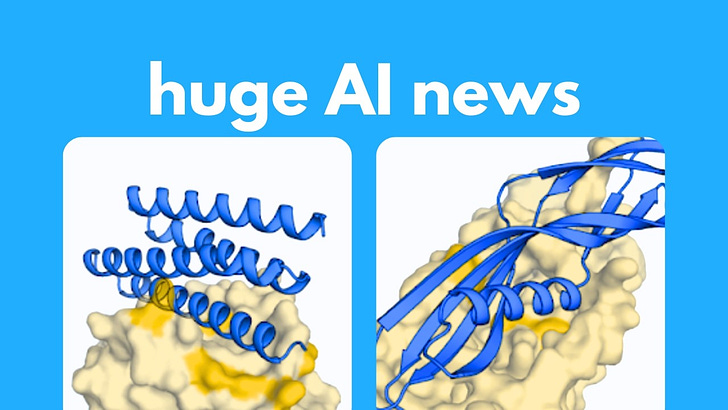AI makes anti-cancer proteins • Next GPT revealed • AI agents create their own economy & government • AI news this week
Welcome to the AI Search newsletter. Here are the top highlights in AI this week.
Google DeepMind has introduced AlphaProteo, an AI that designs custom proteins for medicine. This system can create proteins that bind to specific targets much better than current methods, helping in cancer treatment and virus prevention. It could save years of research and lead to faster, more effective therapies with fewer side effects. Read more
Altera's Project Sid has created over 1,000 autonomous AI agents that interact in a Minecraft world, forming their own society. These agents can work together to build economies, governments, and cultures, operating without human help for extended periods. This breakthrough could change how we solve complex problems by testing solutions in virtual environments before applying them in reality. Read more
Elon Musk’s xAI has launched “Colossus,” the most powerful AI cluster in the world, featuring 100,000 Nvidia H100 GPUs. Built in just 122 days, this massive system is set to double in size soon, aiming for 200,000 GPUs. With such power, xAI’s Grok 2 could challenge leading AI models like OpenAI's GPT-4. Read more
OpenAI Japan’s CEO announced that the upcoming AI model, GPT-Next, will be 100 times more powerful than GPT-4. This new model will achieve its performance boost through better architecture and learning efficiency, rather than just increased computing power. Additionally, a more advanced model called Orion is expected in 2025. Read more
Turbotype is a Chrome extension that allows you to type faster by setting customizable shortcuts, designed to boost productivity and save time. Easily create, save, and use keyboard shortcuts for frequently used phrases. It’s free forever - try it out today!
Safe Superintelligence (SSI), a new AI startup co-founded by former OpenAI chief scientist Ilya Sutskever, has raised $1 billion to develop safe AI systems. The company focuses on creating superintelligent AI that is safe for humans and plans to invest heavily in research and development before launching products. With a valuation of $5 billion and support from major investors, SSI aims to attract top talent to drive its mission. Read more
MiniMax is a new king of AI video generation. It allows users to create short video clips from text prompts. Developed by the Chinese startup HaiLuo, it allows users to generate 6-second videos at 25 frames per second. The tool is currently free to use with no limitations.
Groq has launched LLaVA v1.5 7B, a new AI model that understands both images and text and is four times faster than GPT-4o. This model can answer questions about images, generate captions, and assist with tasks like inventory management and creating descriptions for visually impaired users. Groq is currently offering it for free in "Preview Mode," allowing developers to explore its capabilities. Read more
uPix is an AI Selfie Generator that allows users to turn into anyone in just one click. Select from a vast array of templates, ranging from superheroes to business portraits, and even anime characters. Try it out today!
Reflection 70B is a groundbreaking open-source language model that can self-correct its answers before finalizing them. Developed with GlaiveAI, it outperforms leading closed-source models like GPT-4o across various benchmarks. The model's weights are available on Hugging Face, with an even larger version set to be released soon. Read more
A study found that communication similar to language helps artificial networks learn better. Researchers used networks that acted as teachers and students, showing how effective communication improved task performance. This highlights the importance of sharing information clearly for better learning outcomes. Read more
Researchers have created a new AI method that improves the reconstruction of high-resolution images from low-resolution data. This technique, called neural phase retrieval (NeuPh), uses advanced deep learning to capture detailed information, making it possible to accurately reconstruct complex structures. NeuPh outperforms traditional methods and works well even with limited data. Read more





